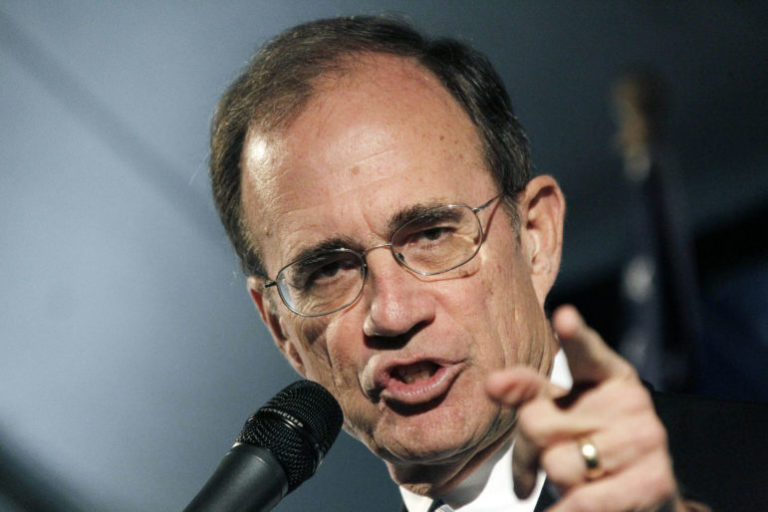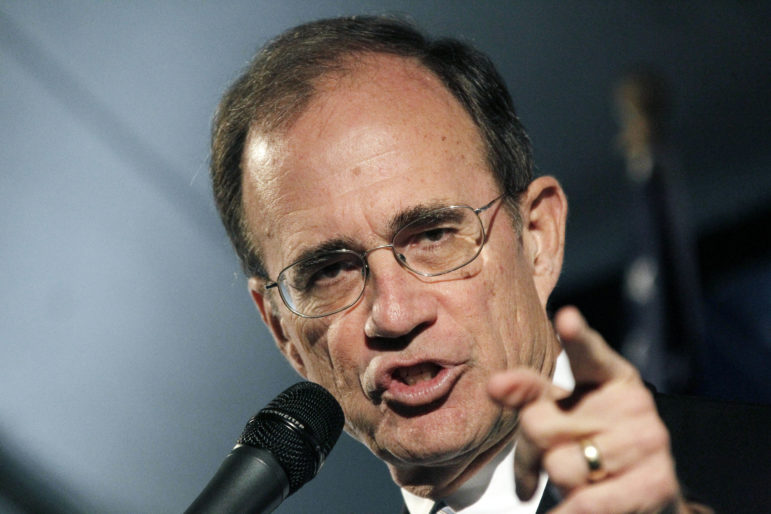

2012 AP file photo
Lt. Gov. Delbert Hosemann said Tuesday that touch choices awaited the state Legislature.
The Mississippi Legislature could be facing the most difficult decisions of the past century in terms of developing a budget for the next fiscal year and in getting through the current fiscal year, Lt. Gov. Delbert Hosemann said Tuesday after hearing an update on the state’s economic outlook.
Legislators were interested in the briefing for two reasons. They not only want to know the economic outlook of the state, but they also are trying to understand how state revenue collections would be impacted by the economy.
In other words, legislators want to know what will be the level of the cuts they’ll have to make.
Hosemann projected that revenue collections could be below the estimate used to construct the current $6 billion budget by as much as $400 million for the current fiscal year and down as much as $800 million for the next fiscal year, beginning July 1. If Hosemann is correct, that could force legislators to make double digit cuts in the state budget for the upcoming fiscal year, though, they do have reserve funds that could be used to offset the cuts.
But at any rate, legislators were told that it will take time for the nation and the state to recover from the economic slowdown caused by the coronavirus.
“We have essentially slammed on the brakes, resulting in a rapid and precipitous decline in the national economy,” said State Economist Darrin Webb who briefed senators and Hosemann Tuesday as they resumed the 2020 session with the intent of completing a budget in late June.
Webb said such a rapid decline was unprecedented and that the level of economic growth would not return to pre COVID-19 levels until sometime in 2022 on a national level and not before 2023 in the state. He said Mississippi routinely trails the nation in recovering from economic downturns.
Webb pointed out that at the end of 2019 Mississippi’s gross domestic product (total value of goods produced and services) was still slightly below the pre-recession 2008 peak and that jobs had only recently surpassed the 2008 peak in Mississippi.
And then in the first quarter of 2020 the bottom dropped out as the economy was shut down because of the COVID-19 pandemic.
Webb said the economies of the state and of the nation will begin growing in the third quarter of 2020, but the growth will be from such a low level that it will take time for the recovery to be completed.
“This will be a short recession, but it will be a slow recovery,” Webb said.
He said the nation’s GDP dropped in the first quarter by an annualized rate 36.5 percent and that the state’s GDP plummeted on an annualized level of 43.6 percent. Webb said projections are that the economy will begin rebounding, leaving the nation’s GDP at a decline of 7.3 percent for the year and the state’s decline at 7.6 percent. By contrast the decline during the Great Recession on the national level was 2.3 percent and 4.7 percent on a state level.
The projected decline on the national level would represent the biggest drop in the GDP since after World War 11 when the economic production needed to fight the war was abruptly stopped.
Webb said the growth in jobs will occur slower than the increase in the GDP. The U.S. lost more than 21 million jobs in March and April while the state lost 117,00 jobs in April. In the Great Recession that started in 2008, the state lost 78,000 jobs.
One of the first decisions that legislators will need to make in crafting a budget is how to deal with about $350 million in personal income tax collections for the current year, but will not be collected until July of the next fiscal year. The issue has developed because state leaders opted to allow people to postpone filing their taxes from April 15 in the current year to July 15 in the next fiscal year.
If legislators opt to use those funds in next year’s budget it would place more of a burden on legislators to balance the budget for the current fiscal year.
“It is just a shell game anyway you go,” Revenue Commissioner Herb Frierson told legislators. The budget strain will be intensified in the year that the collections are not used.
In other words, it appears legislators have no easy answers.
The post Legislators face historically tough budget choices with shortfall projections as much as $1.2 billion appeared first on Mississippi Today.
- Quotes: Republicans debating Medicaid expansion share thoughts on key meeting day - April 23, 2024
- Medicaid expansion negotiators still far apart after first public meeting - April 23, 2024
- Former, incoming heads of state chamber, other business leaders endorse full Medicaid expansion - April 23, 2024